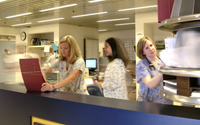Collaborative aims to ease nursing shortage
MUSC has been successful in raising $4 million earmarked to increase the number of baccalaureate, master’s and doctoral prepared nurses in South Carolina. The funds will set up the South Carolina Nursing Collaborative, the goal of which is to ease the severe nursing shortage in South Carolina.The collaborative is a unique relationship between academic centers and the clinical facilities that would employ the centers’ graduates.
 The
following clinical facilities have made financial commitments to the project:
East Cooper Regional Medical Center in Mount Pleasant, Greenville Regional
Medical Center, Hilton Head Medical Center and Clinics, the Medical University
Hospital Authority in Charleston, McLeod Regional Medical Center in Florence,
and the Ralph H. Johnson VA Medical Center in Charleston.
The
following clinical facilities have made financial commitments to the project:
East Cooper Regional Medical Center in Mount Pleasant, Greenville Regional
Medical Center, Hilton Head Medical Center and Clinics, the Medical University
Hospital Authority in Charleston, McLeod Regional Medical Center in Florence,
and the Ralph H. Johnson VA Medical Center in Charleston.
The Medical University Hospital Authority has been a leader among this group, providing the single largest contribution — $1 million during the next four years.
“The new funding will allow the MUSC College of Nursing to add eight new faculty members and develop online educational programs,” said Gail Stuart, R.N., Ph.D., dean of the College of Nursing, who engineered the collaboration.
Anticipated results of the collaboration follow:
- The number of students enrolled in the Medical University’s College of Nursing baccalaureate program in Charleston will double. Currently the college can accommodate 50 new nursing students a year. There are approximately 200 qualified applicants vying for these 50 spots a year. Beginning next academic year the college will be able to accommodate 100 new students a year.
- The number of nursing students at MUSC’s satellite program at Francis Marion College in Florence will increase. It is anticipated that, during time, enrollment in the baccalaureate nursing program will increase from 32 students a year to 40 a year.
- An online curriculum will be available in the fall of 2003 that will enable registered nurses in the state obtain their bachelor’s degree without leaving their current nursing position. Currently in South Carolina, two-thirds of registered nurses have a two-year rather than a four-year degree. Providing these nurses with the oppor-tunity to get the four-year degree online will improve the quality of nursing care in the state.
- Other online curricula will be developed and made available in the fall of 2004 to enable working nurses to obtain master’s degrees to prepare them for nursing administration and nursing education.
- Continuing education nursing programs throughout South Carolina will be expanded.
“The South Carolina Nursing Collaborative is a win-win situation,” said
Conyers O’Bryan, M.D., a Florence physician and member of the MUSC board
of trustees. “Dr. Stuart has come up with a creative solution to the nursing
shortage in our state. The nursing schools will turn out more qualified
nurses, and the participating hospitals will be able to fill their vacant
nursing slots with well-qualified new graduates. The biggest winner will
be the citizens of our state who will be able to enter a hospital in the
future, knowing there will sufficient, well trained nurses to provide care.
I envision this project becoming a national model.”
Catalyst Online is published weekly, updated as
needed and improved from time to time by the MUSC Office of Public Relations
for the faculty, employees and students of the Medical University of South
Carolina. Catalyst Online editor, Kim Draughn, can be reached at 792-4107
or by email, catalyst@musc.edu. Editorial copy can be submitted to Catalyst
Online and to The Catalyst in print by fax, 792-6723, or by email to petersnd@musc.edu
or catalyst@musc.edu. To place an ad in The Catalyst hardcopy, call Community
Press at 849-1778.